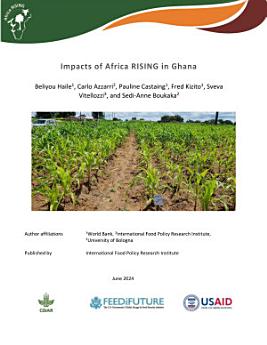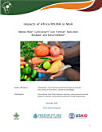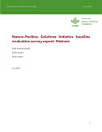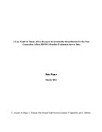Impacts of Africa RISING in Ghana
Haile, Beliyou · Azzarri, Carlo · Castaing, Pauline · Kizito, Fred · Vitellozzi, Sveva · Boukaka, Sedi-Anne
2024 оны 7-р сар · Intl Food Policy Res Inst
Электрон ном
36
Хуудас
family_home
Боломжит
info
reportҮнэлгээ болон шүүмжийг баталгаажуулаагүй Нэмэлт мэдээлэл авах
Энэ электрон номын тухай
Sustainable intensification (SI) of the smallholder sector in Africa south of the Sahara is among the approaches pursued to build resilient food systems that can supply nutritionally adequate food in the face of rapid population growth and climatic changes. This study assesses the impact of Africa RISING, an SI program in Ghana implemented in the poorest and most food insecure areas of the country since 2012. The program first validated and then scaled up a wide range of SI interventions focused on improved agronomic management and crop cultivars; improved livestock feed, housing conditions, and species; crop-livestock integration; integrated natural resource management; vegetable production and nutritional education; and small-scale mechanization. Impact is estimated using two rounds of quasi-experimental panel data (conducted in 2014 and 2020), propensity score matching, and difference-indifferences techniques. The study design allows us to estimate the impact of Africa RISING by comparing outcomes among program beneficiaries with those of two different control groups—one residing in program villages (within village comparison) and another in non-program (control) villages (out-of-village comparison) on several indicators across five SI domains—environment, productivity, economic, human, and social. We also conduct a placebo test comparing non-beneficiaries in the two control groups. Results from panel data analyses show improvements in several indicators in the environmental and productivity domains. We also find a positive impact on use of conservation practices (fallowing, disc/moldboard ploughing, manure), groundnut yield, livestock, net crop income, and women’s likelihood of becoming members of farmers groups relative to non-beneficiaries. We do not find a statistically significant effect on consumption- and asset-based poverty rates, household dietary diversity, and several indicators of maternal and child nutrition. For both beneficiaries and non-beneficiaries, the share of monetary-based non-poor, dietary diversity, and food security have declined between baseline (2014) and follow-up (2020) likely due COVID-19. Our study highlights useful empirical lessons learned for informing future program design and impact assessments.
Энэ электрон номыг үнэлэх
Санал бодлоо хэлнэ үү.
Унших мэдээлэл
Ухаалаг утас болон таблет
Андройд болон iPad/iPhone-д Google Ном Унших аппыг суулгана уу. Үүнийг таны бүртгэлд автоматаар синк хийх бөгөөд та хүссэн газраасаа онлайн эсвэл офлайнаар унших боломжтой.
Зөөврийн болон ердийн компьютер
Та компьютерийн веб хөтчөөр Google Play-с авсан аудио номыг сонсох боломжтой.
eReaders болон бусад төхөөрөмжүүд
Kobo Цахим ном уншигч гэх мэт e-ink төхөөрөмжүүд дээр уншихын тулд та файлыг татаад төхөөрөмж рүүгээ дамжуулах шаардлагатай болно. Файлуудаа дэмжигддэг Цахим ном уншигч руу шилжүүлэхийн тулд Тусламжийн төвийн дэлгэрэнгүй зааварчилгааг дагана уу.







